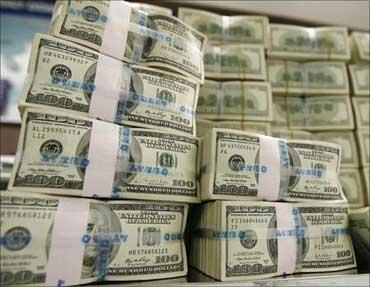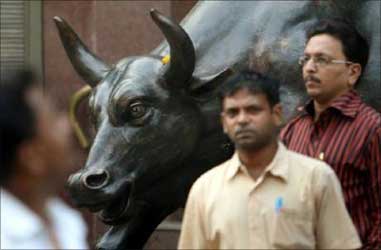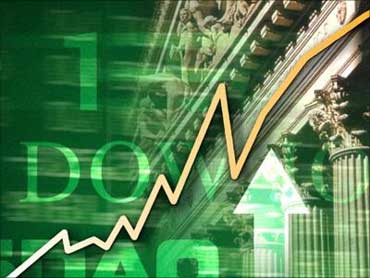Photographs: Reuters Krishna Merchant
Amid global events such as Ireland's debt crisis, monetary tightening in China and the North Korean artillery barrage, the US dollar has strengthened.
This rising strength of the dollar in the last one month has been partly responsible for crimping the market rally in emerging markets, including India.
Among other reasons for the selling seen in equities could be some profit booking by investors post the rally seen in recent months.
However, experts suggest that Indian investors should not read too much into the dollar's recent rise, as other factors like the strength or weakness of the local currency - in our case the rupee - will have an equally strong bearing on the markets.
Since India's economy is expected to grow at a robust rate over the next few years, a firm rupee could compensate for any appreciation in the dollar against other global currencies.
Hence, they say the dollar-Sensex negative co-relation may not always work.
...
Dollar's gain = Sensex's loss?
Image: Trading partners of the US.A safe haven?
The dollar index tracks the greenback against six major currencies of countries that are trading partners of the US, and to a large extent indicates the strength or weakness in the US dollar.
The index is used as an indicator by overseas fund managers to hedge their positions and limit the impact of a correction in various asset classes, including equities and commodities.
For most part of 2010, global investors showed increasing appetite for Indian and emerging-market equities as well as commodities (including precious metals) and shunned the greenback.
But, the current trend has defied predictions of a weak dollar, leading to a decline in emerging markets of late.
Since Diwali, the dollar has risen over 5 per cent and is showing signs of strengthening, while the Sensex has dipped by an equal margin.
...
Dollar's gain = Sensex's loss?
Photographs: Reuters
To an extent, the rise in demand for the dollar is because it has gained a safe-haven status as investors have started fleeing from commodities and equities led by concerns that the Ireland contagion may hit Portugal and Spain, and also concerns about the Korean military skirmish.
P Phani Sekhar, fund manager, Angel Broking, says, "Traders do not invest in a market because the dollar is giving them one or two per cent arbitrage.
It is only because they have different hedge positions that movement in the dollar actually compels them to pull some money off the table from emerging markets to cover their hedge, which is currently happening."
...
Dollar's gain = Sensex's loss?
Image: People walking past the BSE bull.Photographs: Reuters
Seasonality play
The negative relationship between the dollar index and the Sensex has become very stark in the past few weeks or even recent years.
But this inverse correlation may not always work. Analysts say the relationship is cyclical or seasonal and may change from time to time. The seasonal play can be quarterly, yearly or multi-year.
Mukul Pal, chartered market technician and co-founder, Orpheus Capitals, says, "The dollar index and Sensex correlations move cyclically; they can increase, decrease and stagnate."
Seasonality can give a cue if the Sensex may underperform the dollar.
Hence, if the dollar rises, the Sensex will fall by a certain percentage. And it may also outperform the dollar, whereby the greenback surge may have no impact on the Sensex, Pal says.
...
Dollar's gain = Sensex's loss?
Dollar gain temporary
During global wobbles, investors pull their investments out of emerging markets into developed markets.
Only when there is global risk aversion, the dollar index rallies and the Sensex falls, says Moses Harding, executive vice-president & head - Global Markets Group, Indusind Bank. This may be a temporary phenomenon, he adds.
So, what's the near-term outlook for the dollar and the Sensex?
"After outperforming global equities for more than a few months, the Sensex should underperform the rest of the global equities and the dollar's strengthening might seem to be the most obvious correlation at play," Pal says.
Rajeev Darji, senior research analyst, commodity & currency, Globecapital, says, "Expect the dollar index to undergo a correction in the near term before it crosses the 82 level. The index is facing resistance at 81.5 on the technical charts. It will test 78-77.6 in the near term before it resumes an uptrend."
...
Dollar's gain = Sensex's loss?
Till end-2010 or early 2011, Pal says, "Our case on the dollar suggests further strengthening and in this case, the dollar's rise may seem to have more impact on Sensex negativity."
Analysts do not see sustainability in the dollar index's strength over the medium term. "When concerns stemming out of Korea and Ireland abate, a reversal in the dollar trend will be sharp," Harding says.
The index will remain under pressure as long as the US maintains near zero interest rates and there is excess liquidity in the system, believes Harding.
Experts, however, advise that merely looking at the value of a currency to take investment decisions may not be a good thing.
They cite the example of the Indian IT industry, saying that during March 2009 and May 2010, the rupee appreciated over 10 per cent but the BSE IT index more than doubled as companies improved productivity, reduced costs and gained from higher volumes.
Likewise, there have been instances when the dollar has appreciated against the rupee but the Sensex has gained.
Thus, they advise giving a higher weightage to macro and micro factors that determine the fundamental strength of a company or asset class, before taking any investment decision.








article